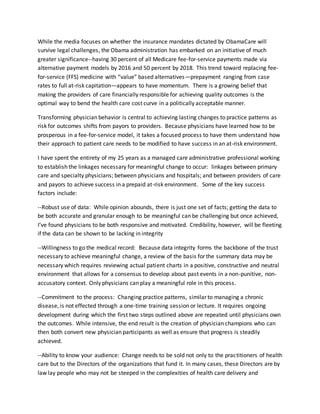
Transforming Healthcare Payment Models from Fee-for-Service to Value-Based Care
- 1. While the media focuses on whether the insurance mandates dictated by ObamaCare will survive legal challenges, the Obama administration has embarked on an initiative of much greater significance--having 30 percent of all Medicare fee-for-service payments made via alternative payment models by 2016 and 50 percent by 2018. This trend toward replacing fee- for-service (FFS) medicine with “value” based alternatives—prepayment ranging from case rates to full at-risk capitation—appears to have momentum. There is a growing belief that making the providers of care financially responsible for achieving quality outcomes is the optimal way to bend the health care cost curve in a politically acceptable manner. Transforming physician behavior is central to achieving lasting changes to practice patterns as risk for outcomes shifts from payors to providers. Because physicians have learned how to be prosperous in a fee-for-service model, it takes a focused process to have them understand how their approach to patient care needs to be modified to have success in an at-risk environment. I have spent the entirety of my 25 years as a managed care administrative professional working to establish the linkages necessary for meaningful change to occur: linkages between primary care and specialty physicians; between physicians and hospitals; and between providers of care and payors to achieve success in a prepaid at-risk environment. Some of the key success factors include: --Robust use of data: While opinion abounds, there is just one set of facts; getting the data to be both accurate and granular enough to be meaningful can be challenging but once achieved, I’ve found physicians to be both responsive and motivated. Credibility, however, will be fleeting if the data can be shown to be lacking in integrity --Willingness to go the medical record: Because data integrity forms the backbone of the trust necessary to achieve meaningful change, a review of the basis for the summary data may be necessary which requires reviewing actual patient charts in a positive, constructive and neutral environment that allows for a consensus to develop about past events in a non-punitive, non- accusatory context. Only physicians can play a meaningful role in this process. --Commitment to the process: Changing practice patterns, similar to managing a chronic disease, is not effected through a one-time training session or lecture. It requires ongoing development during which the first two steps outlined above are repeated until physicians own the outcomes. While intensive, the end result is the creation of physician champions who can then both convert new physician participants as well as ensure that progress is steadily achieved. --Ability to know your audience: Change needs to be sold not only to the practitioners of health care but to the Directors of the organizations that fund it. In many cases, these Directors are by law lay people who may not be steeped in the complexities of health care delivery and
- 2. financing. Having spent 25 years addressing this group of influential stakeholders, I’ve learned that a cogent presentation making logical arguments will get and keep their attention. Overwhelming them with medical and industry jargon is a non-starter. If your organization or client is considering or embarking on the journey from FFS payment to some form of at-risk or value based compensation and needs guidance from a physician who has a proven track record for assisting in the transition, please do not hesitate to contact me. Lowell Gordon MD, MBA 505.660.7197 Lowellg86@gmail.com